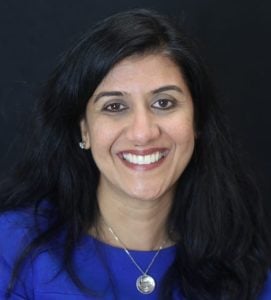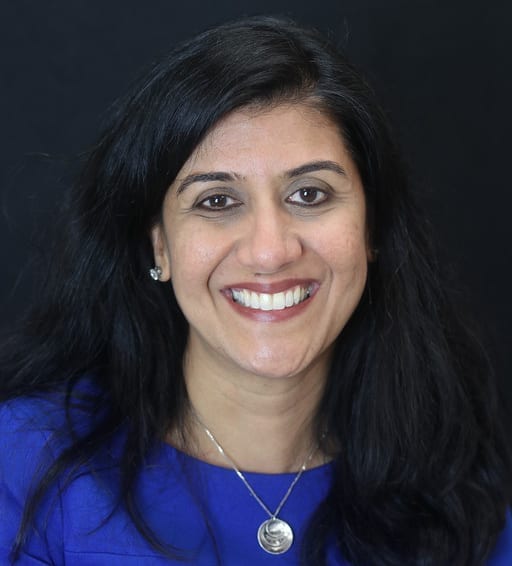By: Anna Akers-Pecht, MS ′20

Bela Moté, CEO
Carole Robertson Center for Learning
Anna Akers-Pecht is an Erikson alumna and member of the Institutional Advancement team. This article is part of a series of interviews she’s conducted over the past few weeks with Erikson alumni exploring how COVID-19 has impacted their work. Read her other interview.
Earlier this month, I sat down (via Zoom) with Erikson alumna Bela Moté, MEd ‘99, CEO of the Carole Robertson Center for Learning to discuss what she is doing for her family, employees, and community during the crisis. I’ve edited some of our conversation for clarity.
The Carole Robertson Center for Learning (the Center) is a non-profit organization serving more than 1,000 children and families on the West Side of Chicago. Working with children from birth to age 17 in both English and Spanish, Center programs include center-based and home-based early childhood programs, school-age programming, microcenters within local elementary schools, and extensive support services for all families. To learn more about the Center, please visit crcl.net.
Akers-Pecht: How was it for the Center to shut down and begin work remotely?
Moté: We, like many other places, shut down rather quickly. We’re a place-based direct service organization, so this idea of moving from a platform of daily contact with families in a variety of settings and programs to everything now being remote is something we weren’t ready for, quite honestly. That’s not in our DNA, though we know that the investments and innovations from this period will lead to sustainable and transformational changes.
“We work in some of the most underserved communities in Chicago, so any change in our services has a chain reaction [for] our families’ access.”
When we went remote, we had to think of these things as parallel processes —there is the executive order, there’s nothing we can do, and then it’s how you bring your mission to life in a remote capacity. We work in some of the most underserved communities in Chicago, so any change in our services has a chain reaction [for] our families’ access: from very basic needs to child-centric, developmentally appropriate kinds of programs and services. Their children were not at home with them during the day, so they didn’t have to have essential items like diapers, wipes, baby food, formula. We had to factor in the cost for what it would be for families who have to provide for all of those things that they don’t have in their budget—with the reality that many have been furloughed or have jobs that get paid under the table. Whatever they get in terms of food stamps might not be enough to support the household need.
We decided that every Monday, our two brick-and-mortar buildings—one in North Lawndale and one in Little Village—would become distribution hubs, especially for children with families under the age of three. We closed March 17. That following Monday, the 23rd, was our first time. We did what we knew to do—we opened our doors, made sure we had whatever we could pull together. [At the time of our conversation, the Center had opened their doors three Mondays for distribution and served close to 400 families.] And every time, we hear from the families about what else they need. So that first week, it was really basic items. The second week, we added cereals, fresh milk, because families were asking. We realized—which is an important piece and hasn’t come up in conversation—their food stamps come at the beginning of the month. The beginning of the month is when you stock. By the end, [they’re out]. In our communities, there are multi-generation households. Children of all ages. And now you have dependencies that you didn’t have because everyone is home together 24 hours, 7 days a week. Thanks to funding from the Chicago COVID-19 Response Fund, the Center can now serve the broader communities on the West Side.
[So basic essentials is] one bucket. The second bucket is creative ways to engage children and families. During Monday distribution, we give books, activity packets, toys, simple ready-made things parents can do with their children at home that is no cost, very little stress in terms of planning, and we continue to post resources…we have a YouTube channel for example, we have staff reading to our children and check-in calls from teachers and family support staff on a weekly basis.
Akers-Pecht: What are you doing for your employees during this time?
Moté: If our core value is children and families first, that can never happen without our staff. Our workforce is at the heart of everything. Their safety and wellbeing is top of mind. We have been very fortunate with our public funders—city, government, state…In a very dried pipeline of early childhood workers, the last thing you want to do is furlough or terminate employees, so you get as creative as you can to keep your talented staff onboard because early childhood and out-of-school time programs are providing an essential public good and supporting local, state and national economies. That’s been helpful for maintaining morale and how we support families through it. Many other organizations have had to make very difficult decisions because of this time.
“If our core value is children and families first, that can never happen without our staff. Our workforce is at the heart of everything.”
We’re using technology to the best of our ability. We had our first town hall meeting last week so that they heard directly from me. It’s better for them to hear “I don’t know” directly from me rather than assuming or guessing something bigger that no one is sharing with them. We have 163 staff people. Our Senior Manager of Mental Health is launching a training for staff on what they can do to take care of themselves. Our Health Manager is doing a very comprehensive COVID-19 training: debunking myths, how it is affecting Black and Brown communities, etc.
Before the world changed us, we invested heavily in the mental health and physical wellbeing of our staff, knowing that research shows early childhood staff can be some of the unhealthiest workforce out there—that’s no surprise, since they have a lot of the same stressors as the families they serve. We have a partnership with Lawndale Christian Health Center—they were coming on site and doing Zumba classes and all staff had memberships if they wanted to access the gym. Zumba has now moved virtually online. Now staff are doing it with their families at home—a family affair.
Akers-Pecht: Has anything from your Erikson education helped you during this time?
Moté: Reflective practice—self-reflection is something I’m doing a lot more these days than I normally do. Just asking the question, “How are we showing up? How am I showing up as a leader?” We know what the science tells us about how children learn and develop…Based on what we know, whether on a screen or in a classroom, there are certain things we have to bring to life. Now more than ever, it’s an appreciation of a parent as a child’s first and most important teacher. We have to believe that. We have to continue to partner and equip our families with different skills, different tools, but hold our families in the center now more than ever. As a mom who has a nine year-old who is learning remotely and trying to figure out the world, it is NOT easy.
Akers-Pecht: What are you doing for yourself during this time? For your family?
Moté: Every evening, I try to carve out a little bit of me time. I watch Schitt’s Creek. I try to read as much as I can. There isn’t a lot of time to do a lot of things focused on me. I feel like a juggler!
My daughter is in the third grade. It’s hard for her not to see her friends. They Skype every day at 4 o’clock. She likes that she doesn’t have to wake up as early as she did when she was physically going to school. Tomorrow is her birthday. She’ll have a Zoom birthday in the evening.
Akers-Pecht: What has given you hope?
Moté: Personally, it’s my daughter and watching her resilience and seeing how quickly she is adapting to this new normal. That is a gift, because I get to wake up and see that every single day. It’s hopeful for me to think that there are lots of little ones who are waking up and doing that for their parents. There are institutions like the Center that have always stood by the communities that they serve and find very creative ways to continue to partner and do what’s right in the most selfless way possible.
In this pandemic, what I believe is that our humanity will rise—I really believe that—what I hope is that it sustains…For me, it’s always about the kiddos. We have to do right by our kiddos. If we don’t, then the next generation pays a hefty price. I’m forever grateful to my board, my staff, my team, and to this Mayor and Governor who have really put people at the forefront of all of this. I can do my slice to make sure that this piece sustains in our community.
“Personally, it’s my daughter and watching her resilience and seeing how quickly she is adapting to this new normal [that give me hope] …It’s hopeful for me to think that there are lots of little ones who are waking up and doing that for their parents.”
Akers-Pecht: What can other people do in terms of doing their part in the community?
Moté: First, stay home until the Governor lifts the order! Second, there are lots of ways to volunteer and get involved even remotely. Whatever your passion is, it doesn’t have to be children and families like mine is. If there is something that fuels you, and you feel that there is a way to get involved or support, do it. Never has social media been more powerful of a tool to create community. Just because you’re ordered to stay at home doesn’t mean you can’t do.
Humility is an important part of what I believe in. While the Center is doing incredible work, right now, so are many, many other organizations, funders (public and private), public officials and countless other partners. That is what fueling the sustainability of our communities: many of us doing extraordinary work in these extraordinary times.

Join the Erikson family with monthly news + events updates shared by academics, community members, and families.